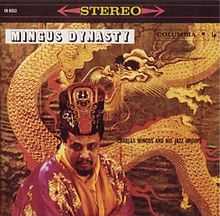Mingus Dynasty
From Wikipedia, the free encyclopedia
For the band, see Mingus Dynasty (band).
| Mingus Dynasty | ||||
|---|---|---|---|---|
 | ||||
| Studio album by Charles Mingus | ||||
| Released | 1959 | |||
| Recorded | November 1–13, 1959 | |||
| Genre | Post-bop[1] | |||
| Length | 59:15 | |||
| Label | Columbia | |||
| Producer | Teo Macero | |||
| Charles Mingus chronology | ||||
| ||||
| Professional ratings | |
|---|---|
| Review scores | |
| Source | Rating |
| Allmusic | |
Mingus Dynasty is an album by Charles Mingus, recorded and released in 1959. It is the companion album to the classic Mingus Ah Um and was inducted in the Grammy Hall of Fame in 1999.
Track listing
All compositions by Charles Mingus except where noted.
- "Slop"
- "Diane"
- "Song With Orange"
- "Gunslinging Bird" (Originally titled "If Charlie Parker Were a Gunslinger, There'd Be a Whole Lot of Dead Copycats")
- "Things Ain't What They Used To Be" (Mercer Ellington)
- "Far Wells, Mill Valley"
- "New Now Know How"
- "Mood Indigo" (Barney Bigard, Duke Ellington)
- "Put Me In That Dungeon"
- "Strollin' " a/k/a "Nostalgia In Times Square" (Mingus, George Gordon) Bonus track on CD
Personnel [3]
- John Handy - alto sax
- Booker Ervin – tenor sax
- Benny Golson - tenor sax (2, 3, 4, 6, 10)
- Jerome Richardson - baritone sax (2, 3, 4, 6, 10)
- Richard Williams - trumpet (2, 3, 4, 6, 10)
- Don Ellis - trumpet (1, 5, 8, 9)
- Jimmy Knepper – trombone
- Roland Hanna - piano (1, 2, 3, 4, 5, 6, 8, 9)
- Nico Bunink - piano (7, 10)
- Charles Mingus - bass
- Dannie Richmond – drums
- Teddy Charles - vibes (2, 3, 4, 6)
- Maurice Brown - cello (1, 9)
- Seymour Barab - cello (1, 9)
- Honi Gordon - vocals (10)
50th Anniversary Legacy Edition
In 2009 Sony's Legacy Recordings released a special 2-disc 50th Anniversary Edition of Mingus' seminal 1959 album Mingus Ah Um that also includes Mingus Dynasty in its entirety on the second disc.[4]
References
- ↑ The Absolute Sound (134): 55. February/March 2002. "Mingus Ah Um and Mingus Dynasty are considered his best post-bop."
- ↑ Allmusic review
- ↑ . Accessed February 14, 2012
- ↑ Album Review - Mingus Ah Um: Legacy Edition. Pitchfork.com. Accessed: January 11, 2009
This article is issued from Wikipedia. The text is available under the Creative Commons Attribution/Share Alike; additional terms may apply for the media files.